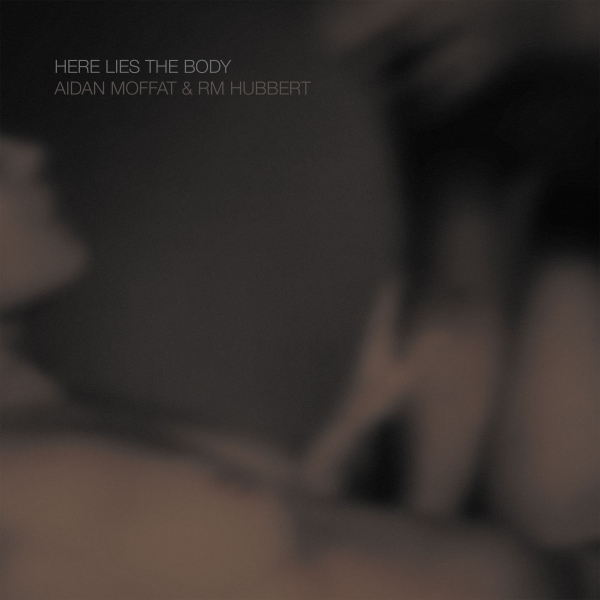Aidan Moffat is no stranger to producing excellent works built on collaboration post Arab Strap. In particular he’s produced two stunning albums with jazz musician Bill Wells (Everything’s Getting Older is arguably as good as anything he produced with Arab Strap). Here Lies The Body is a body of work produced with RM Hubbert – an astonishingly consummate solo artist and guitarist in his own right – who has been a mainstay of the Glasgow DIY scene since the early nineties. Though the two have collaborated before, it hasn’t been on anything of this scale, and they are such obvious bedfellows it’s surprising we are only just hearing it now.
Moffat’s usual set of preoccupations are visited here – he’s always got a hard-on for the ones that got away – but Here Lies The Body is punctuated with a more pronounced sense of nostalgia and sadness. Indeed, many of the songs seem to have some meditation on the nature of memory itself. Opener ‘Cockcrow‘ – a call and response with Siobhan Wilson, who also contributes cello to the album – meditates on the futility and untenable nature of the narrators’ relationship, its world-weariness juxtaposed with Hubbert’s restive flamenco guitar.
‘Mz. Locum‘ (which initially bears charming melodic resemblance to Love’s ‘Alone Again Or’) is a tale of complicated lust, Moffat sounds like a wounded bear in his reminiscence of this carnal episode. The wry, self-depreciating humour found here is counterbalanced by sincere and empathetic moments: ‘She Runs’, with its fizzing electronic accompaniment, is a woozy exploration of the memory of a woman’s youth, peppered with the sort of detail that articulates perfectly how memory can be conflated and warped over time; it has a meditative tone similar to David Keenan’s wonderful novel ‘This Is Memorial Device’.
‘Quantum Theory Love Song’, the album’s most philosophical and heartbreaking moment, is a conversation between two ex-lovers deliberating that, perhaps in a parallel universe, their love wouldn’t have waned, before deciding that there theories are all speculation anyway, and is ‘a leap of faith that’s just as likely as God’. John Burgess’ gorgeous, forlorn saxophone parts drift in and out as Moffat, glass half full, concludes that they can ‘look at the stars and see what they want to see.’
Album highlight ‘Zoltar Speaks’ is oddly reminiscent of fellow Glaswegian Limmy’s ‘Millport’ sketch – a vividly nostalgic song that has both gallows humour and an excellent reveal – it’s an example of Moffat’s storytelling at its very best. Indeed, the whole record goes into rich, novelistic detail about astutely observed minutiae of life.
This is a tremendously tender record even by Moffat’s standards, the pantomime villain moustache swirling of his personality heard in songs like ‘Glasgow Jubilee’ is relatively absent; here’s he’s resigned to himself, his flaws, and the inevitability of just riding out the waves of chaos that life sends our way. It’s through this that Here Lies The Body, in spite of touching on some fairly grim detail, is one of the most quietly optimistic records that Moffat has ever made – increasingly at peace with insecurities, flaws, and things beyond his control. This is articulated perfectly on album closer ‘Fringe’- where our protagonist, holidaying at a campsite, wanders out in the woods to urinate and mediates on the enormity of things and their own comforting irrelevance by gazing upwards at ‘Cassiopeia and Cepheus/ Andromeda and Perseus’ – away from the ‘perfect mothers handing out sticks and marshmallows’ – an image that’s a perfect microcosm for the emotions this record expresses so beautifully.
Here Lies The Body is released on 11th May through Rock Action.




